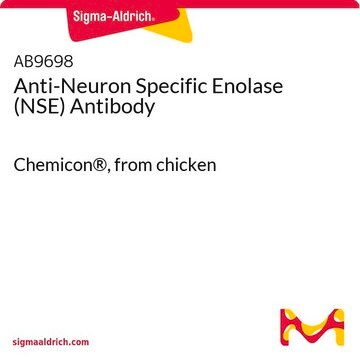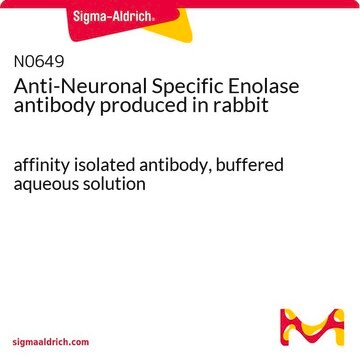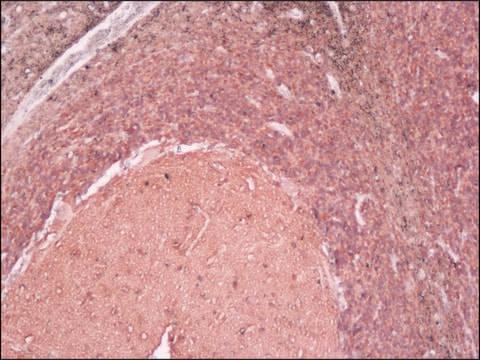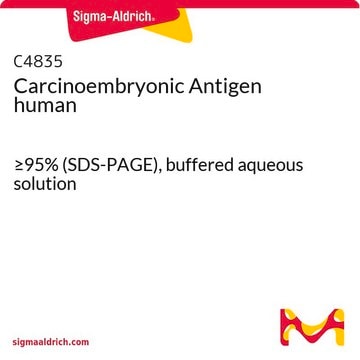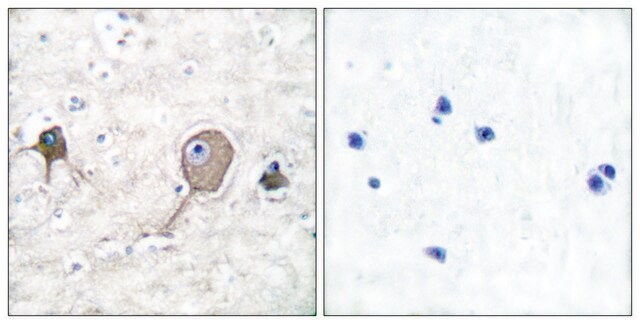N4773
Neuron-specific enolase from human brain
≥95% (SDS-PAGE), buffered aqueous solution
Synonyme(s) :
2-Phospho-D-glycerate hydro-lyase, Enolase, Neuron-specific from human brain, NSE, Thermolabile antigen A
Se connecterpour consulter vos tarifs contractuels et ceux de votre entreprise/organisme
About This Item
Numéro MDL:
Code UNSPSC :
12352204
Nomenclature NACRES :
NA.54
Produits recommandés
Source biologique
human brain
Niveau de qualité
Essai
≥95% (SDS-PAGE)
Forme
buffered aqueous solution
Activité spécifique
≥10 units/mg protein
Numéro d'accès UniProt
Conditions d'expédition
dry ice
Température de stockage
−20°C
Informations sur le gène
human ... ENO2(2026)
Description générale
Neuron-specific enolase (NSE) is a neuronal form of the glycolytic enzyme enolase, which was first found in extracts of brain tissue.
Application
Neuron-specific enolase from human brain has been used in a study to assess human amniotic mesenchymal stem cells in the treatment of focal cerebral ischemia. It has also been used in a study to investigate sinonasal teratocarcinosarcoma with rhabdoid features.
Actions biochimiques/physiologiques
Neuron-specific enolase (NSE) is expressed in all neuronal cell types, and its expression marks the acquisition of synaptic function. Following acute neuronal injury, NSE levels are increased in neuronal cell bodies. Increased levels of NSE in serum and cerebrospinal fluid have been used as markers for injury and neuronal cell death. Tumors derived from many cell types, including most neuronal and neuroendocrine tumors, express NSE.
Neuron-specific enolase promotes survival of neurons and can provide neuroprotective effects by binding to neurons in a calcium-dependent manner.
Définition de l'unité
One unit causes the formation of 1.0 μmole of phospho(enol)pyruvate per minute at pH 6.8 at 25 °C
Forme physique
Solution in 100 mM Tris-HCl, 5 mM MgSO4, 250 mM KCl, pH 5.0-5.2
Code de la classe de stockage
12 - Non Combustible Liquids
Classe de danger pour l'eau (WGK)
WGK 1
Point d'éclair (°F)
Not applicable
Point d'éclair (°C)
Not applicable
Faites votre choix parmi les versions les plus récentes :
Déjà en possession de ce produit ?
Retrouvez la documentation relative aux produits que vous avez récemment achetés dans la Bibliothèque de documents.
Transplantation of human amniotic mesenchymal stem cells in the treatment of focal cerebral ischemia
Li, F., et al.
Molecular Medicine, 6, 625-630 (2012)
Jo-Heon Kim et al.
Pathology international, 61(12), 762-767 (2011-12-01)
Sinonasal teratocarcinosarcoma (SNTCS) is a very rare tumor developed in the nasal cavity and paranasal sinuses. The rhabdoid phenotype represents an aggressive biological behavior, but the rhabdoid feature has hitherto not been reported in cases of SNTCS. A 46-year-old man
Neuron-specific enolase is produced by neuroendocrine tumours
Tapia, F., et al.
Lancet, 317, 808-811 (1981)
T Hattori et al.
Neuroscience research, 21(3), 191-198 (1995-01-01)
We previously reported that the gamma gamma-isozyme of enolase, NSE), one of the glycolytic enzymes, promoted the survival of embryonic rat neocortical neurons in culture, but alpha alpha-isozyme (non-neuronal enolase) had no effect. In the present study, the neurotrophic effects
[Clinicopathologic observation of renal carcinoid tumors].
Po Li et al.
Zhonghua bing li xue za zhi = Chinese journal of pathology, 41(12), 846-847 (2013-01-18)
Notre équipe de scientifiques dispose d'une expérience dans tous les secteurs de la recherche, notamment en sciences de la vie, science des matériaux, synthèse chimique, chromatographie, analyse et dans de nombreux autres domaines..
Contacter notre Service technique
